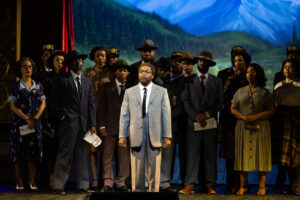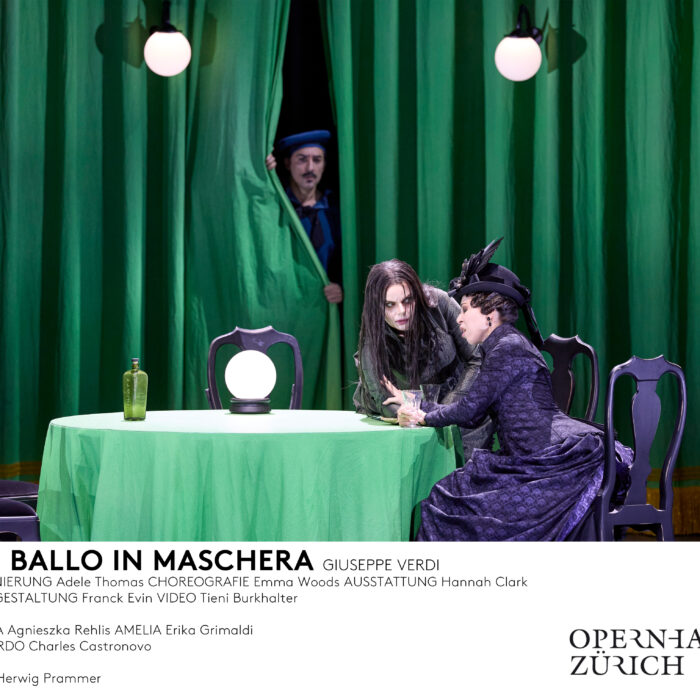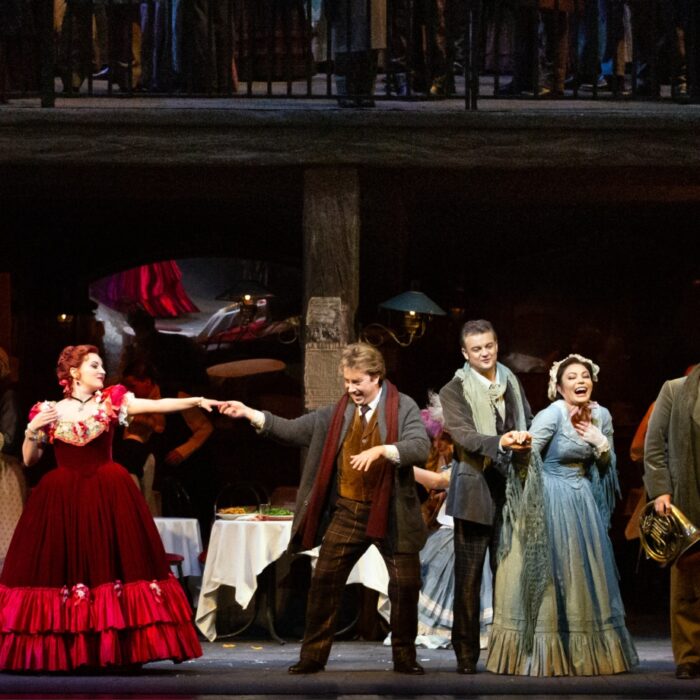
Metropolitan Opera 2023-24 Review: X: the Life and Times of Malcolm X
Afrofuturism & History Meet Brilliantly at the Met
By Chris Ruel(Credit: Marty Sohl)
The Metropolitan Opera’s 2023-24 season unfurled a tapestry of music, history, and Afrofuturistic magical realism with Broadway producer Robert O’Hara’s “X: The Life and Times of Malcolm X,” composed by Anthony Davis, to a libretto by Thulani Davis, based on a story by Christopher Davis. The Met, traditionally a bastion of opera’s classic repertoire, transformed into a forum for reflection on social justice, equal rights, and the ongoing danger of police brutality or vigilante justice that Black Americans continue to face. It was an evening with profound impact.
The staging was as bold as the imposing X emblazoned across the Met curtain. With the lights descending into darkness, the auditorium rumbled and shook. The mothership had landed — magnificent and mysterious. The audience was transported to a place where the violence of Earthly living would eventually be transformed into a peaceful, celestial tomorrow among the stars. It is there where Black people live freely, not under the scourge of racism.
Baritone Will Liverman, embodying the titular X with a stately presence, initially presented vulnerability, his back to the audience and arms outstretched under a piercing spotlight. It was quite a sight and a jaw-dropping opening.
Liverman was ringed by people in costumes of Sci-Fi royalty — a shimmering mix of purple, white, and blazing silver, with touches of the past, present, and future spun by the imaginative loom of costume designer Dede Ayite. At first, the scene was perplexing — an opera about Malcolm X featuring a spacecraft? However, it all came back around, and what had been inscrutable had turned crystal clear.
As Liverman stood stock still, an ensemble of dancers moved with a primal urgency, their bodies contorting, twisting, and seizing in a frenzied dance before abruptly halting, frozen in the tractor beam, ready to ascend and enter the ship. What the audience witnessed wasn’t the start of the show but the conclusion of Malcolm’s saga, revealed in the opera’s opening moments.
This narrative choice served as a thread through the production. Before the audience was Malcolm’s ascension into the stars, his evolution from Malcolm Little to el-Hajj Malik el-Shabazz, and, ultimately, to a martyr whose voice transcended his mortality. There is a hint of the messianic, a man whose death came after struggling against earthly powers, rising Christ-like to Heaven.
A quick word about Afrofuturism. The concept has precedents worth noting. Sun Ra, the jazz innovator, is a prime example, taking on an Egyptian deity’s name and claiming Saturnian origins. His work, especially the album “Space Is the Place,” showcases the early fusion of these themes. Equally influential is funk pioneer George Clinton, who, with his “Mothership Connection” tour, dramatized the Afrofuturist aesthetic, landing on stage from a spaceship and emerging as his alter ego, Dr. Funkenstein.
The Story
In 1931 Lansing, Michigan, the local UNIA chapter meets at Reverend Earl Little’s house. When Earl is late, tension rises over white supremacist threats. After a police officer reports Earl’s death by streetcar, suspicions arise within the community that his death was no accident. Louise’s (Leah Hawkins) mental collapse led to the state taking custody of the children. When Malcolm’s mother is hospitalized, his half-sister, Ella (Raehann Bryce-Davis), takes him to Boston.
About 1940, Boston: Country boy Malcolm adapts to middle-class Black life, immersing in the music and nightlife. He learns from a metaphorical character named Street (Victor Ryan Robertson) how to make his way among the hustlers, making money by playing dice and shooting pool. This leads to his later involvement in a burglary, which lands him in jail. It is here that his anger at racial injustices is clear.
Between 1946–48, Malcolm’s prison time is transformative, influenced by his brother Reginald (Michael Sumuel) and the teachings of Elijah Muhammad (Victor Ryan Robertson) of the Nation of Islam. Post-incarceration, Malcolm, now Malcolm X, rises as a charismatic leader, establishing temples and stirring crowds with his advocacy.
1952–63: Malcolm X meets Elijah Muhammad, begins ministering, and becomes a prominent figure in the civil rights movement. His inflammatory comment on JFK’s assassination leads to conflict with Elijah, who upbraids his disciple for increasing the number of enemies when Black folk have far too many to begin with. He also points to Malcolm’s rising fame and rhetoric as detrimental to the Nation of Islam.
In 1963, tensions with the Nation of Islam prompt Elijah to silence Malcolm. A dispirited Malcolm embarks on a pilgrimage to Mecca, where he finds a broader perspective on unity and faith.
1964–65: Returning to a rioting Harlem, Malcolm, now espousing a global anti-racism stance, forms the Organization of Afro-American Unity. Despite death threats, he continues to speak out until his assassination at the Audubon Ballroom. A moment that stopped the hearts of the audience, even causing some to cry.
A Homecoming of Sorts
“X” was a house debut, not a world or New York premiere. The show had its first New York showing in 1986 at New York City Opera Company when renowned soprano Beverly Sills helmed the organization.
Her New York Times obituary laid out her mission for the company: “Her vision for revitalizing the City Opera included offering unusual repertory and making the company a haven for talented younger American artists. Under her, the repertory significantly diversified, with productions of rarities like Wagner’s early opera ‘Die Feen,’ Verdi’s ‘Attila,’ and Thomas’s ‘Hamlet,’ as well as new operas like Anthony Davis’s “X (The Life and Times of Malcolm X).” (emphasis mine).
And while it took 37 years for it to make its way back to the Big Apple, better late than never. Rather than slap the Met for dragging its feet regarding contemporary opera, clap it on the back for adjusting its repertoire to include new(er) operas rather than continuing to play it safe, reviving warhorse after warhorse.
Anthony Davis’ score was influenced by jazz, as well as other opera composers, a central one being Wagner, who created a new kind of music. So did Davis, with his unique amalgamation of styles. Impressive was the facility in which his mixture occurred. Here, the conductor, Kazem Abdullah, coaxed luscious and cacophonous sounds from the incomparable Met orchestra, showing it can play any form of music required. Davis’ Episteme jazz octet was in the pit, too. Abdullah worked tirelessly on the podium to bring the music and musicians together to form a powerful whole greater than the sum of its parts.
The singers, too, had their work cut out for them as they navigated a score with ever-changing beats and blaring sound (a good type of blaring) over which they had to cut.
Davis included “jam sessions,” if you will, within the score. These tunes sounded as improvisational as anything heard in a club — except they weren’t improvised; they were fully part of the score. The music provided a sense of time and place within the physical world while also giving insight into Malcolm’s mind, which was deeply influenced by jazz.
In an interview on the Met website, Anthony Davis spoke of the different speaking rhythms and cadences used by Martin Luther King Jr. with those found in Malcolm’s speech patterns. Where King produced flowing, melodic lines, Malcolm X was more staccato. Davis went further and compared the civil rights leaders to jazz greats John Coltrane and Miles Davis, relating how Coltrane had the mellifluous sound of Coltrane and Davis the more clipped.
The Vocal Lines
Thulani Davis’ libretto proved less is more. The poet used repetition to punctuate scenes. These sections had undertones of chant and call and response as one cluster of singers repeated what had just been sung. This reduced the amount of words and increased the emotional power of the lines.
Louise’s (Leah Hawkins) Act one aria is full of gripping lines, speaking of a “boy born in terror, marked by fear … Not four, not ten, so many men rushing in a Black man’s night.” A chorus of neighbors appears, chanting “smoking smoldering, burning…” as Louise sings of their house being burned to the ground.
Malcolm’s Act one rage aria lists his grievances with white men: “I’ve shined your shoes, I’ve sold your dope, hauled your bootleg, played with hustler’s hope. But the crime is mine; I will do your time so you can sleep at night … You want the truth, but you don’t want to know.” Liverman delivered these lines with such a depth of feeling that this reviewer doubts he was the only audience who got shivers down his spine. Davis’ poetry is a gut punch of truth. As we’ve witnessed the back and forth over the 1619 Project and the teaching of Black history in school, the truth Malcolm sings of is inconvenient and anathema to the myths created over centuries of American history.
Street’s aria was loaded with advice and more truth bombs. “The white man takes, while the Black man breaks,” and “If you try to change things, they will take your life.”
In his duet with Elijah (Victor Ryan Robertson), existential questions are asked: “Where have you come from?” This elicits a blistering response by Malcolm: “I come from a desert of pain and remorse, from slavery and exile, from jails and brute force.” When Elijah asks Malcolm who he aspires to be, the answer is simple yet profound: “I would just be a man.”
The Act three duet between Malcolm and Betty (Hawkins) has Malcolm at his lowest point, banished from speaking because of his inflammatory comments regarding Kennedy’s assassination and the Nation’s belief that he’s causing trouble when there’s enough to go around already. He is alone, guideless. Betty sings, “Soon the henchmen will come and take his sky and stars,” hearkening back to the opening scene. The kicker of the aria is Betty asking Malcolm, “When a man is lost, what is left inside?” His response is that Allah made him, gave him life, and “now I must ask his help to give a life back to God.”
This is unforgettable, haunting writing.
Different aspects of the vocal performances have been discussed, but overall, Liverman’s, Hawkins’s, and Robertson’s voices were in top form. Liverman’s powerful baritone laid Malcolm’s anger and frustration bare.
Hawkins, as both Louise and Betty, shone with her voice laden with sorrow and a yearning for change. Robertson’s smooth tenor fits both Street and Elijah, with the former perfect for a jazzy tune and the latter for the care inherent in his tone as he speaks with Malcolm. This changes believably when Elijah rebukes Malcolm over his comments regarding Kennedy’s murder.
Raehann Bryce Davis, who played Ella and the Queen Mother, had limited stage time, singing-wise, but her stately, near-constant presence as the stunningly garbed Queen Mother couldn’t be missed. She realized the idea of Afrofuturism, an African Queen watching over her “children,” waiting for them to join her and their ancestors among the stars.
As the young Malcolm Little, Bryce Christian Thompson’s pure and clear voice was a reminder of Malcolm’s boyhood innocence. Bravo to such a young artist in a key role.
The potency of the opera lies in its portrayal of Malcolm as a man, not a mythic hero — embodying the very answer he gives Elijah about his desired identity. Malcolm aspires to nothing more complex or grandiose than to reclaim his and his people’s humanity. As the opera suggests, among the cosmos, he finally achieves this simple yet profound wish.


